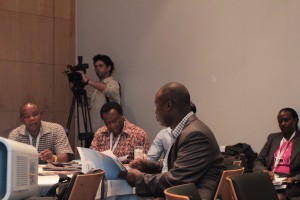‘Shared learning and collaboration’ reaps rewards for countries participating in the Research for Health Africa programme…
 It was encouraging to hear participants at a recent workshop on the Research for Health Africa (R4HA) programme, endorsing the use of ‘shared learning and collaboration’ as key tools to help improve health and development in Africa.
It was encouraging to hear participants at a recent workshop on the Research for Health Africa (R4HA) programme, endorsing the use of ‘shared learning and collaboration’ as key tools to help improve health and development in Africa.
The workshop was held in Cape Town at the end of April 2012 as a side session to Forum 2012, and was arranged to encourage new country partners to join the programme. The workshop used the ‘shared-learning’ approach by asking programme partners to demonstrate the benefits they have experienced with R4HA and how the programme has helped them to contribute to their goal of strengthening their research and innovation systems.
Throughout the workshop, success stories of how collaboration and partnerships had enabled countries to strengthen national research and innovation systems were shared. For instance, the Ministry of Health in Senegal, through the R4HA programme, now holds regular meetings with its partner Ministry of Science and Technology. Both Ministries have now put in place established key points of contact for discussing collaborative strategies.

In the centre of the photo is Dr. Hassan Mshinda of COSTECH in attendance with other participants at the Research for Health Africa session. Pic by Gabi Falanga
Mozambique has been following the progress made by the Tanzania Commission for Science and Technology (COSTECH) in implementing a customised web-based system to review and grant funding to research proposals. Drawing on the experiences of COSTECH in the rollout of its system has given Mozambique valuable insight into the decisions that they need to make for their own management information system.
The workshop also gave an opportunity for shared learning and collaboration between COHRED’s programmes, as representatives from the West Africa programme were amongst the attendees. The West Africa programme also uses regional collaboration to tackle development of national research systems and shared learning is becoming a reality in Guinea Bissau, Liberia, Mali and Sierra Leone. Among the activities to happen soon is joint ethics training, organised and facilitated by COHRED and drawing on experiences from other parts of the continent, such as Botswana and Tanzania
Looking to the future, participants called for improved and broader collaboration, with the recommendation that the responsibility for health should go beyond the health sector to include inputs from other sectors such as agriculture. This cross-sectoral approach would be a co-ordinated way of tackling health issues and preventing the fragmentation of valuable resources that currently exists.
Funders and countries were also called upon to collaborate more, as a way of ensuring that research contracts are fair and ethical for both the host country and the donor, and that research carried out is contributing to tackling the identified priorities of the country.
Advances in new technologies and the increasing use of social networking sites were highlighted as tools helping to improve collaboration and shared learning. From COHRED’s point of view, this is certainly the case, as several key projects are now harnessing the use of on-line platforms and virtual collaboration. For example, COHRED’s MARC project (Mapping African Research Ethics Review Capacity) provides an interactive web-based map of basic contacts and capacity information for Research Ethics Committees (RECs) and Medicines Regulatory Authorities (MRAs). The project has led to the development of www.researchethics.org, a platform with an integrated social networking element designed to facilitate better communication between RECs and MRAs across Africa.
For those working in Research Ethics and protecting the rights of research participants, such as children or vulnerable groups, the platform is one solution to share the problems undoubtedly encountered by many RECS across a region, or continent.
COHRED facilitates shared learning and collaboration as we see it as a key element for success in research and innovation. We support the notion of improbable partnerships to achieve our goals – a theme echoed at Forum 2012 – whether they are across governmental departments, countries and regions or between the public and private sectors. Hearing first-hand how this technique has helped countries make steps to improve health, equity and development is certainly an incentive for us to continue collaborating and sharing.
Best wishes,
Carel.
* Did you know that learning how to manage health research institutions, or national research systems, or national innovation systems can not be done at any university?
* Did you realise that the professionals responsible to steer and stimulate national research and innovation can only learn from what they see in neighboring countries or from what they hear from colleagues in the same positions.
That is why COHRED provides and creates opportunities, platforms and meetings to ‘connect’ the people and institutions responsible for national governance and management in research and innovation for health. This is not ‘sexy’ – it is difficult to show that we ‘save lives’ – but it is essential to sustainable, country-driven development. We believe in process as much as in products and outcomes – help us increase and improve creating more opportunities for south-south learning and practice. Become a donor or facilitator or collaboration. Contact andrew@cohred.org
